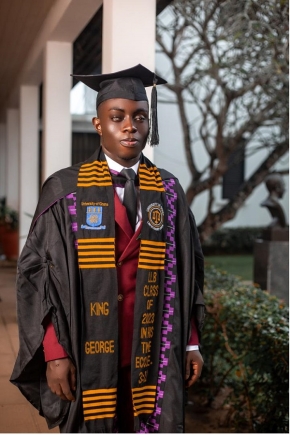
Visually impaired student’s inspiring journey through law school
A determined 28-year-old George Amoah defied the odds and successfully completed his Bachelor of Law degree at the University of Ghana (UG) School of Law.
Advertisement
Despite being visually impaired, he graduated with a Second Class Upper degree, a testament to his unwavering dedication and innovative approach to education.
Amoah's journey was marked by a commitment to finding effective ways to learn. He explained to The Mirror that relying solely on Braille wasn't feasible, especially for studying law. Instead, he used a laptop equipped with speech software that read texts aloud to him.
He further gained permission from authors to scan books, which he then processed using the speech software, providing him access to the necessary materials. Sharing his story with The Mirror, he said "Consistency and determination have been my two guiding principles in life since I became visually impaired many years ago."
His journey began with adversity. An accident caused his visual impairment, prompting him to initially attend the Akropong School for the Blind in the Eastern Region. Over time, however, he transitioned into mainstream education during junior high school and continued his studies at Okuapeman Senior High School, also in the Eastern Region.
Challenges
Amoah explained that he started his law lectures in the middle of September 2019 while his colleagues started classes earlier in August of the same year.
“I was not even understanding the lessons. The challenge was that although I was reading cases here and there, I didn't even know what I was doing from the onset. But I decided to continue because I came here for a purpose. I believe that even with God, if you are neither consistent nor determined, you can't achieve anything in life, including studying law,” he stated.
Hope
He said one day, a window of hope came when “the university authorities issued a communique suggesting that the University will start contract law.
“So I started again with the Contract Law and fortunately for me, everything became clearer to me. So I picked it from there. Level 100 was not encouraging to me at all. During level 200, we faced a lot of challenges because of the COVID-19 pandemic when everything was online,” he recounted.
According to him, the course was tougher at Level 200 than Level 100 because the study materials for the courses were very voluminous and he needed to read extensively. However, at one point, he was doing selective reading which did not help whenever he sat for examination.
“I think Level 300 was the turning point for me because, at that time, I decided that I really needed to read and complete every topic and that was my plan. In fact, I loved Level 400 more than the other academic years because it was at that level that I understood everything about the law and how it works,” he added.
Undeterred, he embraced his guiding principles, consistency and determination, even when the coursework seemed overwhelming. His perseverance paid off as he mastered the materials and eventually scored a Second Class Honours (Upper Division).
Support at Law Faculty
Navigating exams was another obstacle he tackled ingeniously. Using his laptop and speech software, Amoah listened to exam questions through an earpiece and typed out his answers. Remarkably, he achieved this by mentally visualising the keyboard layout and utilising tactile markers on specific keys.
Throughout his journey, Amoah acknowledged the support of both his classmates and the law school faculty. Amoah commended the lecturers for their readiness to help students in similar conditions.
He, however, noted that because the visually impaired or the physically challenged were in the minority, sometimes, some of the lecturers forgot about their presence while using gestures and signs to explain some of the topics in law to students.
He said during those challenging moments at school, he pleaded with some of his mates who sat close to him to explain what the lecturer was doing or explain to the class to him.
He praised his classmate, Jaqueline Tweneboah, for her assistance and collaboration in overcoming study challenges.
However, Amoah mentioned that there's room for improvement in terms of inclusion for visually impaired students, as some lecturers inadvertently overlooked their unique needs.
Amoah's story doesn't end here. He aspires to continue his legal education by enrolling at the Ghana School of Law (Makola).
"I told myself even if I was not understanding the whole concept, I really need to take time to continue, with my consistency and determination," he said.




